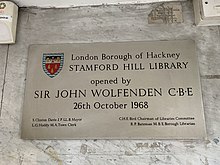John Wolfenden, Baron Wolfenden
This article needs additional citations for verification. (October 2013) |
The Lord Wolfenden | |
|---|---|
| Member of the House of Lords | |
| Assumed office 12 July 1974 | |
| Director of the British Museum | |
| In office 1969–1973 | |
| Preceded by | Frank Francis |
| Succeeded by | John Pope-Hennessy |
| Vice-Chancellor of the University of Reading | |
| In office 1950–1963 | |
| Preceded by | Sir Frank Stenton |
| Succeeded by | Sir Harry Pitt |
| Personal details | |
| Born | 26 June 1906 Swindon, Wiltshire, England |
| Died | 18 January 1985 (aged 78) Guildford, Surrey, England |
| Education | Queen Elizabeth Grammar School, Wakefield |
| Alma mater | Queen's College, Oxford |
John Frederick Wolfenden, Baron Wolfenden, CBE (26 June 1906 – 18 January 1985) was a British educationalist probably best remembered for chairing the Wolfenden Committee whose report, recommending the decriminalisation of homosexuality, was published in 1957. He was headmaster of Uppingham and Shrewsbury public schools.[1]
Early life
[edit]Wolfenden was born on 26 June 1906 in Swindon, Wiltshire, England.[2] He was the son of George Wolfenden and Emily Hannah Gaukroger, both born in Halifax, Yorkshire. George Wolfenden became an official of the West Riding Local Education Authority based in Wakefield, West Riding of Yorkshire, where John attended Queen Elizabeth Grammar School. He won a scholarship to Oxford.
Professional life
[edit]Having studied in Oxford, Wolfenden became a don at Magdalen College, Oxford, in 1929.
John Wolfenden was the headmaster of Uppingham School (1934–1944) and Shrewsbury School (1944–1950) and chairman of various government committees which mostly focused on education and problems with youth.
In 1950 he became Vice-Chancellor of the University of Reading and found time to write two books, Family Affair and The Steele Age, both part of the series of 'Take Home Books'.
From 1954 to 1957 he was Chairman of the Departmental Committee on Homosexual Offences and Prostitution, known in shorthand as the Wolfenden Committee after himself,[3] whose report was published in 1957. Wolfenden had been appointed to head the committee by the then Home Secretary, Sir David Maxwell Fyfe to consider whether the existing laws on these should be changed. Maxwell Fyfe would later come to oppose the liberalisation of gay rights while sitting as Lord Kilmuir in the House of Lords. Geraldine Bedell noted the irony of this, and commented: "Perhaps he [Maxwell-Fyfe] thought, by handing over to a committee, to shelve the issue. Perhaps he assumed Wolfenden would find against, in which case, he chose a curious chairman, because Wolfenden had a gay son, Jeremy."[4]
In 1957, Wolfenden chaired an independent committee initiated by the Central Council of Physical Recreation which investigated the role of various statutory and voluntary groups in sport in the United Kingdom. The committee published its report in 1960, and fifty years later it was still an influential work in its field.[5]
In 1962, the Privy Council appointed Wolfenden as Chairman of the Council for the Training of Health Workers and the Council for the Training in Social Work, two bodies established by the Health Visiting and Social Work (Training) Act 1962.[6]

Wolfenden was director of the British Museum from 1969 to 1973,[citation needed] became President of Chelsea College in 1972, Chairman of the Chelsea Building Society and Metropolitan Association of Building Societies in 1978.[3]
Personal life
[edit]Wolfenden married Eileen Spilsbury in 1932, they had two sons and two daughters.[3] His elder son was Jeremy Wolfenden, a foreign correspondent for The Daily Telegraph and a British spy.[7]
He died aged 78, on 18 January 1985 in Guildford, Surrey, England.[2]
Thoughts and ideas
[edit]In his essay The Gap—The Bridge, Wolfenden discusses the problems with institutional dichotomy.
His memoirs were published by The Bodley Head in 1976, under the title of Turning Points.
Titles
[edit]Wolfenden was appointed a Commander of the Order of the British Empire (CBE) in 1942, and was knighted in 1956.[8][3]
He was created a life peer on 12 July 1974 with the title Baron Wolfenden, of Westcott in the County of Surrey.[9]
See also
[edit]References
[edit]- ^ "Wolfenden Report Full Text" (PDF). Sexually Transmitted Infections. 33 (4): 205. December 1957. doi:10.1136/sti.33.4.205.
- ^ a b "Wolfenden, John Frederick". Oxford Dictionary of National Biography (online ed.). Oxford University Press. doi:10.1093/ref:odnb/31852. (Subscription or UK public library membership required.)
- ^ a b c d Mosley, Charles (ed.). Debrett's Handbook 1982, Distinguished People in British Life. Debrett's Peerage Limited. p. 1626. ISBN 0-905649-38-9.
- ^ Geraldine Bedell, "Coming out of the dark ages", The Observer, London, 24 June 2007.
- ^ "Sport and the Community". Central Council of Physical Recreation. 2 September 1960. Archived from the original on 19 October 2013. Retrieved 18 October 2013.
- ^ Ministry of Health, Circular 24/62, 19 October 1962, Copy held by Kendal Archives, WC/W/A1568/Box 9/W/2/1
- ^ French, Philip (24 June 2007), "We saw the light, but too late for some", The Observer, retrieved 15 August 2015
- ^ "No. 40829". The London Gazette. 13 July 1956. pp. 4075–4076.
- ^ "No. 46352". The London Gazette. 24 September 1974. p. 7918.
External links
[edit]- 1906 births
- 1985 deaths
- Academics of the University of Reading
- Alumni of Magdalen College, Oxford
- Directors of the British Museum
- Commanders of the Order of the British Empire
- English non-fiction writers
- Fellows of Magdalen College, Oxford
- Headmasters of Shrewsbury School
- Headmasters of Uppingham School
- Knights Bachelor
- Life peers
- Life peers created by Elizabeth II
- People educated at Queen Elizabeth Grammar School, Wakefield
- Vice-chancellors of the University of Reading
- English male non-fiction writers
- 20th-century English male writers
- Presidents of the Classical Association
